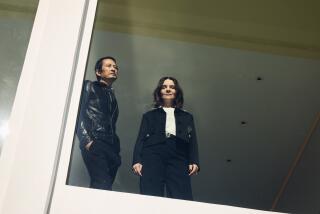Movie review: ‘Mademoiselle Chambon’
People fall in love in every country, but nowhere is the experience put on film with the flawless style, empathy and emotion the French provide. “Mademoiselle Chambon” is the latest in that line of deeply moving romances, an exquisite chamber piece made with the kind of sensitivity and nuance that’s become almost a lost art.
Starring the top-flight acting team of Vincent Lindon and Sandrine Kiberlain, “Mademoiselle Chambon” is about the power of love to disturb as well as elevate, about the profoundly disconcerting experience of falling hopelessly in love when that’s the last thing you want to do.
Impeccably directed by Stephane Brize (who co-wrote the Cesar-winning adaptation of the Eric Holder novel with Florence Vignon), “Mademoiselle Chambon” is less concerned with the protagonists’ ultimate resolution than with bringing us into the journey, showing how it came to be that these people fell and what happens next.
Brize has said it took him 10 years from first reading the original novel to be perceptive enough to convey what its characters were feeling, and the result of that delay is a film that knows its people inside out and has a perfect understanding of the situation of each individual involved.
In this the director is helped by his superb cast, and in particular by his risky decision to cast Lindon and Kiberlain, at one time married in real life but now divorced, as his pair of potential lovers. The complex and contradictory feelings these two must have for each other have given their performances a kind of texture that is little short of remarkable.
Lindon’s Jean is introduced first, in a simple but revelatory sequence showing him breaking up a concrete floor with a jackhammer. As his father before him, Jean is a contractor who builds houses in an unnamed French town, and the sequence is the first indication we get that his character is formidably masculine without being the least bit macho.
Jean is married, and truly happily, to the beautiful Anne Marie (Aure Atika, nominated, as was Kiberlain, for an acting Cesar). The couple love their young son Jeremy and the first scene of the family has all three of them being understandably stumped by the intricacies of French grammar as laid out in homework assigned by Jeremy’s teacher, Veronique Chambon (Kiberlain).
Happenstance throws Jean and Veronique together (the film in some ways echoes David Lean’s classic “Brief Encounter”) and it is clear from the first moment that the meeting is disorienting for both of them. Elegant, Parisian, a self-possessed former violinist who absently does fingerings when she’s nervous, blond Veronique is dark-haired Anne Marie’s opposite in every way, a situation the film underlines by having her wear skirts and dresses while Anne Marie is always in jeans.
The attraction between them deepens when Jean gets to show Veronique what he does and who he is. She asks him to do a kind of mini career day and talk to Jeremy’s class about his occupation, and Jean’s honesty, decency and straightforwardness clearly make an impression on her.
When Jean comes to her apartment to replace a defective window and she gets to see him at work, the feelings intensify, and when she reluctantly agrees to play the violin for him (Kiberlain worked with a coach daily for five months to get the fingering correct), it’s a moment with enormous emotional implications.
If Jean were unattached, or if Veronique were heartless, this would be a very different story. But one of the things Veronique is drawn to about Jean is the way he is connected to family, not only his wife and child but his 80-year-old father, and both parties, even as the depth of their attraction deepen, never allow themselves to forget the obstacles before them.
Because the town they both live in is so small, Veronique and Jean run into each other with a frequency that both pleases and upsets them. Afraid of expressing overt emotion but unable to let the opportunity simply pass by, their prosaic encounters have so much going on under the surface it almost takes their breath away.
Perhaps the thing that is most impressive about “Mademoiselle Chambon” is that so much of what it accomplishes is done without reliance on any dialogue at all. We get to see Jean and Veronique alone with their lives, alone with thoughts that play beautifully and wordless across their faces. This is an observational film, one that lets what’s on the minds of the characters carry its objectives, and no one who has the pleasure of seeing this heartfelt accomplishment will want it any other way.
More to Read
Only good movies
Get the Indie Focus newsletter, Mark Olsen's weekly guide to the world of cinema.
You may occasionally receive promotional content from the Los Angeles Times.











